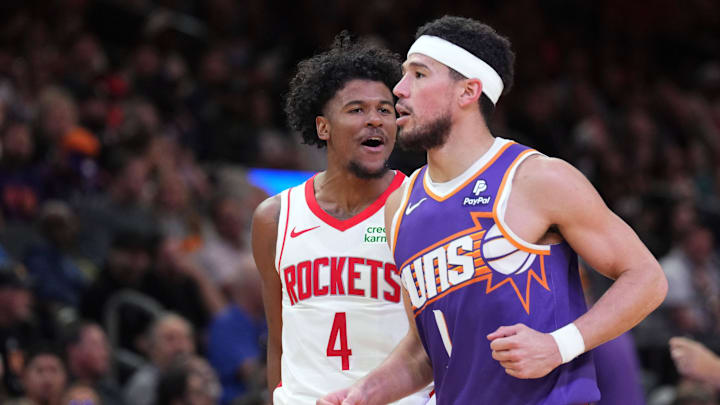The Phoenix Suns have big names. They have scoring talent. They have rim protection, versatile wings, and a couple of new draft selections. But what they don't have, and what no amount of internal optimism is going to change, is a functioning backcourt identity. After shipping out Kevin Durant and finding themselves with a new trio of Devin Booker, Jalen Green, and Bradley Beal, the Suns now face a roster construction problem that they're going to have a hard time fixing.
At its core, the issue isn’t about a lack of star power. It’s about redundancy. All three of Phoenix’s lead guards prefer to create with the ball in their hands. All three can fill it up, but none of them are natural facilitators. Tyus Jones was a solid lead ball-handler last season, but that experiment lasted just one year, and with no new deal in place, he could walk for nothing. Phoenix may not be able to outbid other suitors if Jones finds a better fit.
And if Tyus leaves, there’s not a clear backup plan. The Suns have no real path to a replacement-level point guard, let alone a true floor general. Their salary structure is bloated at the top and flimsy everywhere else. They’re expected to continue cost-cutting this summer, which makes acquiring a legitimate lead ball-handler almost a pipe dream.
The Suns' roster is still unbalanced
But even if they do find a way to land a solid point guard, the bigger concern lingers: How exactly are the Suns planning to balance Green, Booker, and Beal? None of the three are traditional wings. All are best as combo guards who attack downhill and thrive with volume touches. Booker has earned the benefit of the doubt. Beal hasn’t lived up to expectations. And Green, while still young and with more room to grow, doesn’t yet offer the off-ball spacing or discipline to operate in a cohesive three-guard attack.
That leaves the coaching staff in a near-impossible spot. You can only play with one ball. And unless one or more of Phoenix’s guards takes a dramatic step forward as a facilitator or off-ball defender, the fit issues that plagued them last season are likely to get worse, not better.
The Suns may enter the 2025–26 campaign as one of the league’s more talented teams on paper. But on the hardwood, they’re one of the most lopsided. Without a true point guard or a reset in identity, Phoenix is hoping their collection of scorers can coexist in a way that history says rarely works. And that’s a problem no one in the front office seems to have an answer for.
